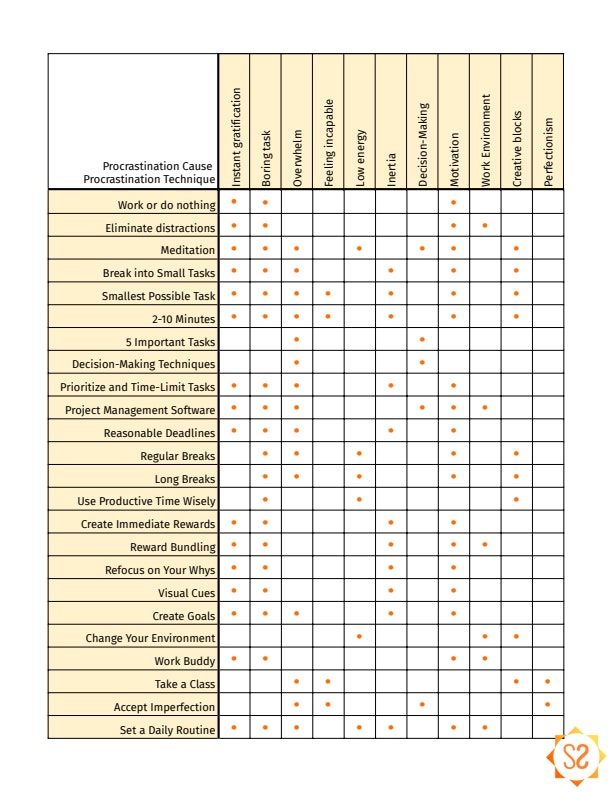Vegan Life | Health
How To Actually Stop Procrastinating: The 3-Step System
March 18, 2023
If you've recently found yourself making coffee, scrolling through social media, playing games on your phone, or using some other distraction to avoid your work, you're not alone. Studies have found that more than 70% of college students reported procrastinating regularly, while 20% of adults in the US procrastinate chronically.
Even prolific artists and writers like Leonardo da Vinci and Ernest Hemingway are known to have frequently put off their work for later. In our modern world, we have even more distractions than the generations that came before us, making procrastination more tempting than ever.

When I found my own procrastination becoming more frequent, I came up with a plan to overcome it by working with my brain instead of fighting against it. This three-step system gradually pulled me out of the procrastination cycle and back on the road to productivity. Implement the following three steps and you'll also be well on your way to beating procrastination and getting more done.
Step 1: Assess Your Procrastination
In order to build an effective plan to overcome procrastination, it's critical to first understand the causes of your procrastination. There are countless tricks and techniques you can choose from, and not all of them will work for everyone. Having a good understanding of why you're procrastinating will help you select the methods that are most likely to work for you.
You might be able to assess your procrastination right now, or you might need to observe your own behavior over a few days. Ask yourself these questions about your procrastination:
Who is around when you're procrastinating? Are you alone? Are you in a loud area where you can't concentrate? Do you have friends or family distracting you?
Where are you when you're procrastinating? What does your environment look and feel like? If you're procrastinating at home or in an office, you might want to change something about your environment. Maybe your chair is too comfortable, leaving you tired. Or maybe it's too uncomfortable and you need an upgrade. Maybe your environment is bland and uninspiring and can use some new decor or fresh flowers.

Are you procrastinating at a certain time? Is there a time of day when you do your best work? If you're usually procrastinating at the same time each day, is it because your energy reserves are low? Or maybe because it's getting close to lunchtime or time to go home?
What are you procrastinating on? Is it only certain tasks you find yourself procrastinating on, or is your procrastination more general?
How are you procrastinating? What other activities are you filling your time with? Are you watching videos, scrolling through social media, or playing games? Are you doing other tasks that are less important?

And most importantly, why are you procrastinating? Consider the answers to the questions above, then ask yourself why? For example, if you're procrastinating on specific tasks, what is it that you don't like about those tasks?
Why do people procrastinate?
Now that you've asked yourself the questions above, you should be forming a general idea of why you're procrastinating, or at least the circumstances in which you tend to procrastinate. If you're still not entirely sure, here are some common reasons why people procrastinate. Check them out and see whether any of these resonate with you.
Desire for instant gratification: In our modern world, instant gratification is more available than ever. Even games on our phones can give us the illusion of instant gratification, despite the fact that there's nothing tangible gained from them. But when we're going to the gym to work out or writing the chapters of a novel, our efforts may not be rewarded for quite a long time. Many people struggle to dedicate time to tasks whose reward is delayed.
The task is too boring: Occasionally we have to do less-than-exciting tasks as a part of our jobs that we generally otherwise enjoy. People often procrastinate on those specific tasks in favor of tasks that they find more interesting.
Overwhelm: Maybe you're not sure where to start. Maybe the project is too large and you feel like it will never get done. Or maybe you just have too many tasks and you don't know how to prioritize them. Feeling overwhelmed often keeps people from starting at all.

Feeling incapable: You may be worried that you're not able to complete your project well because your skills aren't up to par. If that happens, you may be seen as a failure or criticized for your work. So you procrastinate for fear of your imposter status being revealed to the world.
Low energy, feeling tired: There are many reasons why people may feel tired or lacking energy. Regardless of the source, feeling tired can keep us from completing tasks that require a lot of our energy (whether mental or physical).
Inertia (trouble starting): An object at rest tends to stay at rest, even if that object is a human with a project to complete. Sometimes the pain of taking the first step is great enough to keep us from starting our projects. This is especially common with physical tasks like working out or cleaning, and with large projects like writing a book or building an app.
Difficulty making decisions: Many tasks require us to make decisions before we start them, or as we progress through the task. If you struggle with decision-making, you may find yourself delaying the related tasks to avoid making the wrong decision.

Lack of motivation: Sometimes our projects and jobs last quite a long time and our motivation moves further and further to the backs of our minds. Being disconnected from our "whys" can cause procrastination.
Poor work environment: This can take many forms. Maybe there are too many people around distracting you; maybe there aren't enough people around to keep you motivated to keep working. Maybe your workspace is uncomfortable, or possibly too comfortable. Or maybe your equipment is inadequate (like a computer that's too slow, or a poor-quality camera). All of these work environments can allow procrastination to sneak in.

Creative block or stuck on a problem: Creative fields including graphic design, writing, and even coding can all leave you staring at your computer screen unsure of what to do next. This kind of block can eat up hours of our time before we even realize it.
Perfectionism: If you hold yourself and your work to an extremely high standard, you may find yourself procrastinating when you feel that your work might not live up to your standards.
Is it really procrastination?
There are many reasons why people procrastinate, but sometimes there are other issues that need to be addressed first.
If you're procrastinating because of mental health issues (ADHD, depression, anxiety, PTSD, OCD, etc.), the best thing you can do is get treatment for these conditions. Procrastination here is likely to be a symptom, not the cause. Either way, treatment can help with both.
If you've recently experienced trauma, grief, or a major life change, it's normal to need time to recover. Don't try to force productivity on yourself when your body isn't ready for it. And if you need additional help, seeing a therapist is a great idea.
You might have physical health issues that can cause low energy. In this case, you should do everything you can to improve your physical health, including healthy eating, exercise, and quitting substances such as alcohol and coffee. If you have a chronic condition that can't be improved with lifestyle changes, talk to your doctor and make sure you have realistic expectations for yourself and your productivity.
Another reason people find themselves procrastinating is that they actually don't want to be doing the work they're doing. Maybe they did like their work at one point, but over time their interests or dreams have changed. Or maybe they're only doing it because they feel they have to. If this is you, I'd encourage you to consider reassessing your goals rather than trying to force yourself to do work you don't enjoy.

Step 2: Develop a Plan
Once you understand the underlying causes of your procrastination, choose 2-3 techniques that address these root causes. Here are 24 techniques that work, along with the situations that they're best for. (There's also a chart at the end of this section that shows which techniques are best for each common procrastination cause).
24 Techniques for Overcoming Procrastination
1. Work, or do nothing. Set aside time each day to work on your project. The amount of time you need will depend on the size and type of the project; for example, you might set aside 1 hour for daily studying or 4 hours for a research project. Instead of forcing yourself to work, give yourself the option to not work. The key is that if you choose not to work, you also can't do anything else.
This is a good technique to use if you're finding yourself distracted by other things. It also works if you need to work on a task that requires your complete attention, but you prefer to be also watching videos or listening to music at the same time.
2. Eliminate distractions. If you find yourself procrastinating by watching videos, scrolling social media, playing games on your phone, etc., you might want to find a way to enforce limits on yourself.
For example, I use an app on my phone that can set daily time limits for specific apps. I chose the apps that I frequently find myself using when I'm procrastinating and I set reasonable daily limits (10-30 minutes per day). You can also set these types of apps to block certain apps during your work hours, or you could just put your phone away in another room.
If your television is a common distraction, you could unplug the television or cover it with a blanket while you're working. This adds an extra layer of work between yourself and your distraction, giving you more time to rethink whether you really want to indulge.
3. Meditation and grounding. If you are finding it difficult to concentrate on a task, it might be because your brain is seeking immediate gratification. Our digital age has trained our brains to be this way, with social media, games on our phones, and online videos providing us with instant dopamine.
Taking time each day to disconnect and practice meditation or grounding trains our brains to not get bored when we don't get immediate gratification.
If you try meditation and you're not good at it, don't get discouraged. That's exactly why we practice meditation, to build that muscle. If the meditation muscle was already fully formed, we wouldn't need to practice.

4. Break large projects into small, manageable tasks. If your project feels overwhelming, start by figuring out exactly what tasks you need to do from beginning to end. You can make these tasks as small as you need so they feel manageable. A manageable task might be "write an outline" or "write a 200-word introduction", or it could be "write the first sentence."
If you find yourself working on similar projects over and over, consider creating a template of tasks and duplicating the tasks each time you have a new project. You can use project management software to do this (I like Asana). This works if you don't know where to start or feel overwhelmed by the size of your project.
5. Find the smallest possible task. Maybe even small tasks like "write an outline" (as we discussed above) feel like too much. If that's the case, just start with "write the first heading." As long as you start, no amount of work is too small. From there, keep adding small tasks, or work up to larger tasks each day.
6. Commit to 2-10 minutes. If you're having trouble starting, but you usually enjoy your work after you start, then commit to a small amount of time (2-10 minutes).
I use this technique when I'm putting off working out. I've found that when I'm sitting on the couch I usually want to stay sitting on the couch. But once I get up and start working out, my body also wants to keep working out. So that 10 minutes turns into an hour pretty easily.
7. Choose five tasks. At the end of each day, write down 5 tasks to work on the next day, then arrange them in order of importance and urgency. The next day, focus on these 5 tasks in order of importance. This technique works well if you find yourself procrastinating because you're overwhelmed.

8. Decision-making techniques. If you're having trouble deciding what to work on or making decisions in general, you can use decision-making techniques.
If you're overwhelmed by the number of options, start by eliminating the bad options. Then, consider just two options at a time. Choose the best option of the two, then add another option to compare.
If two options seem equally good, or you're not sure, you can always ask others for their opinion. For example, sometimes I have trouble deciding on a thumbnail image to use for a YouTube video. Rather than spending hours trying to decide, I post the two or three best images in a Facebook group for YouTube creators, and lots of people there help me decide quickly.
9. Prioritize and time-limit the tasks that you procrastinate the most on. When I analyzed my own procrastination, I realized that there were just 3 types of tasks that I tend to procrastinate on. I really dislike those tasks, but they're a necessary part of my whole job.
So each day I make a list of all the tasks I want to complete, and I prioritize them in order of importance and urgency. Then, I highlight the tasks that fall into one of those 3 categories that I dislike. I give myself a limit of 2 hours per day for those tasks, and the rest of the day can be spent on other tasks that I enjoy.
I chose 2 hours because it's long enough to make significant progress, but it's also not taking up the majority of my day. It's not a magic number, though. You can use any number that isn't overwhelming but also allows you to make progress.

10. Use project management software to help stay organized (such as Asana or Monday). If organization and time management are contributing to your procrastination, using project management software can help a lot. Rather than having all your projects and tasks listed in your head or on paper, they're all in a centralized place where you can easily review them and set deadlines.
You can also break your large projects into small, easy-to-complete tasks and set deadlines for the smaller tasks. Checking off completed tasks in these apps can also provide a sense of accomplishment that can increase motivation.

11. Set deadlines that are reasonable. Deadlines that are too far in the future can lead to procrastination because you feel like you have plenty of time. And if your deadline is so close that it feels unattainable, you might also procrastinate out of hopelessness.
If your project will take a lot of time, break each task into small tasks, and set deadlines for the small tasks. Project management software is great for this. Setting deadlines for small tasks helps you stay on track throughout the life of the project and also helps maintain motivation.
12. Take regular breaks. If you're finding yourself feeling burned out and unmotivated, breaks can make a major difference. Especially if you're working on a creative project or a problem-solving task like coding, taking a break can be invaluable. I've often found myself spending hours trying to find a bug in my code, only to later take a break and see it immediately after I return with fresh eyes.
13. Long breaks. If short breaks aren't enough, schedule daily walks for creative inspiration. If you're really lacking inspiration, you may want to take even longer breaks for hikes in nature or people-watching.
Taking a walk is also a good idea if you're feeling a little sleepy after sitting for an extended period of time. (But if you're truly tired, a nap may be a better option).

14. Use your productive time wisely. Be aware of the times when you're most productive and complete your most difficult tasks at that time. If you have a lot of energy in the morning from 10 am - 12 pm, don't use that time responding to emails. Instead, use that time for tasks that require more mental focus.
15. Reward yourself for small and large accomplishments. Sometimes the rewards of our work are not immediate, and our human brains crave some instant gratification.
You can create that instant gratification, though, to motivate yourself through a difficult project. That reward could be something as simple as watching a short video you're interested in after a small task. Or you could buy yourself a treat after you complete a larger project.
16. Consider "reward bundling." With this technique, you'll only indulge in specific rewards when you're also working on a task that you tend to procrastinate on.
For example, you'll only drink hot chocolate while you're writing an article. Or you'll only listen to your favorite podcast while you're working out. Or only watch a certain TV show while you're washing the dishes.
17. Refocus on your whys. Why are you doing this work? I've been working on building my company for almost 3 years. When I first started, my whys were very clear. But as time goes on, it's easy to get so caught up in the work itself that we forget about the whys. Refocusing on that original "why" can be motivating for long-term jobs and projects.
18. Use visual cues to keep your whys top-of-mind. If there's a goal you have that's easy to visualize with a photo (a vacation, college fund for your child, a new car, etc.), use a photo as your phone's lock screen or computer background to remind yourself about your goals. I like to use several photos and rotate them because after a while, my brain will get used to seeing the same picture and it won't have as powerful of an impact.

19. Turn your whys into tangible (but realistic) goals. If you're working on your side hustle to save money for a down payment on a house, work backward from that goal to create smaller goals related to your work. What smaller tasks do you need to get done by what time in order to get that down payment money?
20. Change your environment. If your environment isn't working for you, change it (if possible). If someone at home is distracting you, try working in a library or cafe. If being home alone is leaving you prone to distractions like chores or phone games, try working together with a partner (even if it's over video call).
If you're at home or in your own office, clean your space, change your workstation to be more ergonomic, decorate, or add fresh flowers or a scented candle.
21. Get a work buddy or accountability partner. If you find yourself working harder when you feel like someone's watching you, working alone can be a challenge. One option is to find someone to work together with (in person or by video call). You can also have someone check in on you regularly to see how you're progressing towards your goals.

22. Take a class. Sometimes we procrastinate because we feel like the work we're doing isn't good enough. That may or may not be true, but taking a class can definitely improve your skills and confidence.
23. Accept imperfection. Perfectionists often procrastinate because they won't accept anything less than perfection from themselves. If this is you, have some compassion for yourself and remember that imperfectly done is better than perfect and unfinished.
24. Set a daily routine. Humans are creatures of habit, and once we develop habits, they're a lot easier to maintain. So for the most difficult tasks, try to complete them at the same time of day, or in the same order in a specific routine.

Step 3: Implement Your Plan and Reassess
Once you've chosen your two to three techniques, start implementing them as soon as possible and observe your results. Which techniques are the most effective? Are any of the techniques not effective at all, or minimally effective?
If you still find yourself procrastinating at times, start again at step 1. Reassess your procrastination and choose another technique to replace your least effective technique.
New habits aren't built overnight; give yourself time to increase and strengthen your productivity. If you slip up from time to time, remember that you're human and keep moving forward.
Final Thoughts
Procrastination might affect everyone from time to time. But that doesn't mean it needs to control your life. If you can understand the root cause of your procrastination and address it, you'll be well on your way to crushing your goals and living the life you dream of.
If you tried any of these techniques, please leave a comment and let me know which ones were most effective for you. Or if you have a technique that you think should be added to the list, I'd love to hear about it!
Be sure to give yourself credit for taking the time to finish this article, and now, get to work on your plan!
Sources:
American Psychological Association. (2010, April 27). Chronic procrastination tied to impaired sleep and general health. APA Press Release. Retrieved from https://www.apa.org/news/press/releases/2010/04/procrastination
Schraw, G., Wadkins, T., & Olafson, L. (2007). Doing the things we do: A grounded theory of academic procrastination. Journal of Educational Psychology, 99(1), 12-25. doi: 10.1037/0022-0663.99.1.12
Share this:

















Leave a Comment
I love reading comments! I'll do my best to answer questions, too. If you made the recipe, please leave a star rating, it helps support the blog so I can make more recipes and articles. Thank you!
says